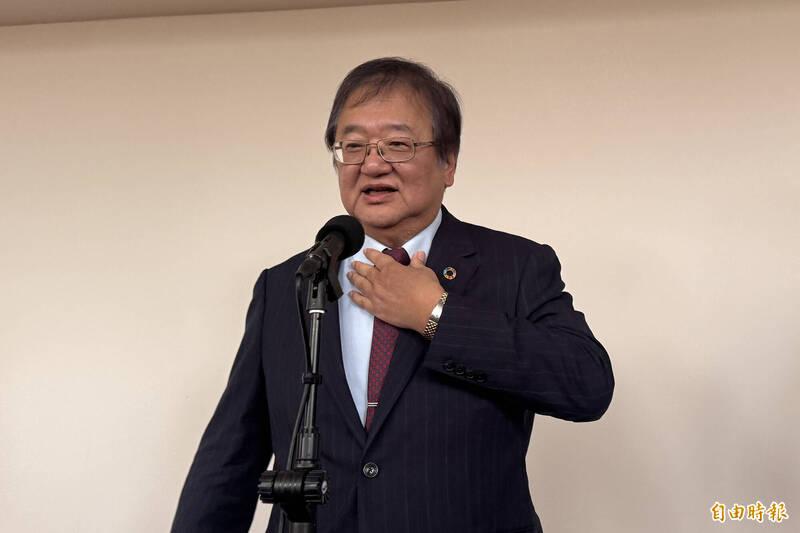Five medical associations today slammed a proposed amendment to the Senior Citizens Welfare Act (老人福利法) which would exempt over-65s in a low tax bracket from paying national health insurance (NHI) premiums.
The Legislative Yuan is expected to hold a vote in the near future to pass a third reading of amendments to the Senior Citizens Welfare Act (老人福利法) in which over-65s in the tax bracket below 20 percent would be eligible for subsidies from the central government.
The proposed amendment would exacerbate generational inequality and the increased financial strain could affect the future of the NHI scheme, five major medical associations said in a joint statement today.

Photo: Chiu Chih-jou, Taipei Times
The five associations are the Taiwan Hospital Association, the Taiwan Medical Association, the Taiwan Union of Nurses Association, the Taiwan Nongovernmental Hospitals and Clinics Association and the Taiwan College of Healthcare Executive.
Between last year and the presidential election in January, presidential candidates and legislators from the Chinese Nationalist Party (KMT) and the Taiwan People's Party (TPP) have pushed the proposal, however the Ministry of Health and Welfare (MOHW) has continually responded that this would cause a financial burden leading to generational inequality.
Up to 70 percent of the NHI’s income is funded by under-65s, so exempting over-65s from insurance premiums would burden the working population, they said, requesting that the proposal immediately be shelved.
The National Development Council estimates that Taiwan is to become a “super-aged society” next year, meaning that 20 percent of the population is 65 or older.
Medical costs for over-65s far exceed all other age groups, while it is estimated that by 2070, the 15-to-64-year-old working-age population would decrease by 9.2 million, while over-65s would increase by 2.48 million, the five medical associations said.
The NHI system was founded on the core principle of equitable risk-sharing, with all citizens contributing their fair share to receive healthcare, but as the elderly require more medical attention and resources, the proposal would affect those contributing to the system, and insurance premiums should instead be calculated based on ability and fairness, the statement said.
If the central government were to provide NT$35 billion (US$1.07 billion) of subsidies, funds could be diverted from public services and welfare for other vulnerable groups including children, women and the disabled, overall impacting societal wellbeing, the associations said.
Furthermore, young people graduating today may not earn as much as previous generations, so the proposed amendment would create generational injustices and infringe on the spirit of “equal burden, equal gain” of the health insurance system whose 30th anniversary will be next year, Minister of Health and Welfare Chiu Tai-yuan (邱泰源) said this morning at the Legislative Yuan, attending a meeting of the Social Welfare and Environmental Hygiene Committee to continue assessing next year’s central government budget for MOHW public services.
Moreover, next year’s NHI spending is to surpass a record NT$900 billion (US$27.5 billion), an overall growth rate of between 3.5 and 5.5 percent, he added.
The proposal would also allow those over 80 to apply for foreign caregivers without requiring the Barthel Index assessment, which measures a person’s ability to complete activities of daily living and mobility. However, the Ministry of Labor already provides alternative access channels for approximately half of applications for international care workers, and the medical community has reached a consensus that standardized professional assessments are in the best interest of those in need of care, Chiu added.

Costa Rica sent a group of intelligence officials to Taiwan for a short-term training program, the first time the Central American country has done so since the countries ended official diplomatic relations in 2007, a Costa Rican media outlet reported last week. Five officials from the Costa Rican Directorate of Intelligence and Security last month spent 23 days in Taipei undergoing a series of training sessions focused on national security, La Nacion reported on Friday, quoting unnamed sources. The Costa Rican government has not confirmed the report. The Chinese embassy in Costa Rica protested the news, saying in a statement issued the same

Temperatures in New Taipei City’s Sindian District (新店) climbed past 37°C yesterday, as the Central Weather Administration (CWA) issued heat alerts for 16 municipalities, warning the public of intense heat expected across Taiwan. The hottest location in Taiwan was in Sindian, where the mercury reached 37.5°C at about 2pm, according to CWA data. Taipei’s Shilin District (士林) recorded a temperature of 37.4°C at noon, Taitung County’s Jinfeng Township (金峰) at 12:50 pm logged a temperature of 37.4°C and Miaoli County’s Toufen Township (頭份) reached 36.7°C at 11:40am, the CWA said. The weather agency yesterday issued a yellow level information notice for Taipei, New

Taiwan’s Liu Ming-i, right, who also goes by the name Ray Liu, poses with a Chinese Taipei flag after winning the gold medal in the men’s physique 170cm competition at the International Fitness and Bodybuilding Federation Asian Championship in Ajman, United Arab Emirates, yesterday.

A year-long renovation of Taipei’s Bangka Park (艋舺公園) began yesterday, as city workers fenced off the site and cleared out belongings left by homeless residents who had been living there. Despite protests from displaced residents, a city official defended the government’s relocation efforts, saying transitional housing has been offered. The renovation of the park in Taipei’s Wanhua District (萬華), near Longshan Temple (龍山寺), began at 9am yesterday, as about 20 homeless people packed their belongings and left after being asked to move by city personnel. Among them was a 90-year-old woman surnamed Wang (王), who last week said that she had no plans